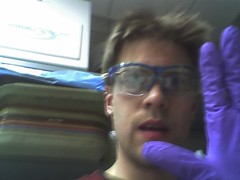The Quotable Asimov
While reading a recent used bookstore miracle discovery--The Intelligent Man's Guide to Science by Isaac Asimov--I came across this section and laughed out loud. I now realize that this may possibly mark one of the geekiest moments of my life, but I pass it on to you regardless:
The puzzle to which I have referred began in 1794, when a Finnish chemist, Johan Gadolin, examined an odd rock which had been found near the Swedish hamlet Ytterby and decided that it was a new "earth." Gadolin gave this "rare earth" the name "yttria," after Ytterby. Later the German chemist Martin Klaproth (the discoverer of uranium) found that yttria could be divided into two "earths," for one of which he kept the name yttria, while he named the other "ceria" (after the newly discovered planetoid Ceres). But the Swedish chemist Carl Gustav Mosander subsequently broke these down further into a series of different earths. All eventually proved to be oxides of new elements named the "rare-earth metals." By 1907, 14 such elements had been identified. In order of increasing atomic weight they are:
- lanthanum (from a Greek word meaning "hidden")
- cerium (from Ceres)
- praseodymium (from the Greek for "green twin," after a green line in its spectrum)
- neodymium ("new twin")
- samarium (from "samarskite," the mineral in which it was found)
- europium (from Europse)
- gadolinium (in honor of Johan Gadolin)
- terbium (from Ytterby)
- dysprosium (from a Greek word meaning "hard to get at")
- holmium (from Stockholm)
- erbium (from Ytterby)
- thulium (from Thule, an old name for Scandinavia)
- ytterbium (from Ytterby)
- lutetium (from Lutetia, an old name for Paris)
Notice a trend? Apparently even chemists can get bored with naming new elements after a while... As the author himself puts it in an aside later the same page:
(Yttrium, though found in the same ores as the rare earths and similar to them in properties, is not a rare-earth metal. It is, however, named after Ytterby. Four elements honor that hamlet--which is overdoing it.)
While we are on this most obscure of topics, it should be noted that there are not only two elements named after France--Francium and Gallium--there is also an element named after gay Paris, Lutetium.
There. I have now alienated or just weirded out anyone who might possibly look at this blog.
Labels: chemistry, elements, erbium, rare earths, terbium, ytterbium, ytterby, yttrium



